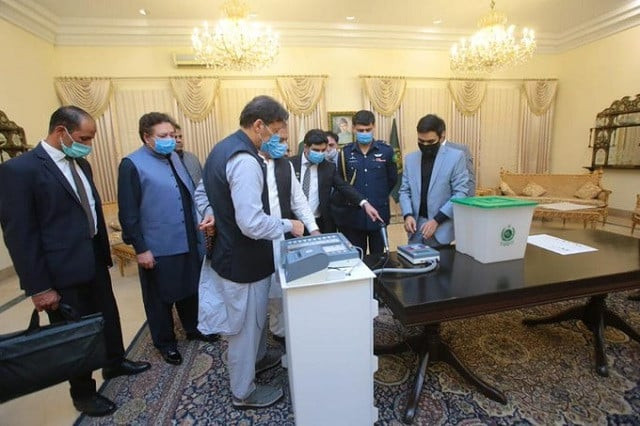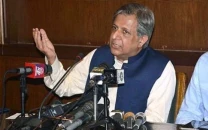Premature to say if EVMs can be used in next polls: ECP
Secretary tells NA standing committee there are challenges in EVMs use

The Election commission of Pakistan (ECP) appeared uncertain on Thursday whether the electronic voting machines (EVMs) could be used in the coming general election, a day after the joint sitting of parliament passed the bill for their use.
During a meeting of the National Assembly Standing Committee on Law and Justice the ECP secretary was bombarded with questions regarding the use of EVMs. During the meeting, chaired by Riaz Fatyana, treasury lawmakers insisted on the use of the EVMs, while the opposition members supported the ECP’s point of view.
The members raised the questions as to how the people of Balochistan would use the EVM to cast their votes in areas where there was no internet. They also asked where the EVMs would be kept. Some members even posed the question to the ECP as to who would be blamed for any possible tampering with votes afterwards.
The ECP secretary told the committee that there were challenges in the use of EVMs, adding that it would be premature to say whether the machines could be used in the next general election. He told the lawmakers that the ECP was working on the concerns regarding Balochistan.
“I can’t answer all your questions at this time,” the ECP secretary told the committee. “There are challenges in using the EVMs,” he said. “There will be 3 to 4 more pilot projects related to the use of EVMs. It is yet to be determined how many EVMs would be required at one polling station.”
Read: Imran sees EVMs as panacea to all poll ills
The National Assembly members belonging to the government side insisted that Parliament was supreme and the ECP prepare to implement the law passed by the joint sitting without any delay. However, the opposition members supported the ECP’s concerns.
The secretary the members of the standing committee that before using the EVMs in the next general election, the ECP would have to go through various stages, including purchase of machine and training of staff.
ECP sources said that the minimum cost of using EVMs would be Rs150 billion. However, they added that despite spending that much money, the transparency and credibility of the election could be doubted because the machine and software could easily be replaced or temper with.
The sources also raised concerns about the machine transfer and safety, adding that educating voters about the technology would also be a barrier. They further said that the procurement of large-scale EVMs was also a difficult task.
Bar tenures
While disposing other agenda items, the committee unanimously recommended that the tenure of the office-bearers of all the bar associations of the country, except the Supreme Court Bar Association (SCBA), should be enhanced to two years from the current one-year period.
The committee also recommended that campaigning for the bar elections should be restricted to two months before the elections, which should be held in the month of December while the new office-bearers assume their responsibilities on January 1.
The meeting considered several bills, including those relating to the tenures and election procedures of the bar associations. The meeting was informed that no adequate response had been received from the bars regarding the tenure and the election procedure.
While discussing the Legal Practitioners and Bar Councils (Amendment) Bill, 2020 (Section 5 and schedule), moved by Nafeesa Shah, the committee heard that the Sindh Bar Council (SBC) had categorically supported the bill. Shah requested the committee to pass the bill.
The committee approved the recommendation for enhancement of one seat in the SBC for the Khairpur District. And keeping in view the, consensus of all the members, the committee recommended that the amendment bill should be passed by the assembly.
Similarly, while considering the Legal Practitioners and Bar Council (Amendment) Bill, 2020 (Section 5), the committee was informed by the mover that the K-P Bar Council supported the bill. However, the committee deferred the bill till its next meeting, as no written comments had been received.
The committee considered the Constitution (Amendment) Bill, 2021 (Article 51 and 106) moved by Zahid Durrani. The ECP opposed the bill, saying that the government was holding fresh census, adding that the grievance of the mover would be addressed after delimitation that would follow the new census.
Law Ministry officials said after the merger of the erstwhile Federally Administered Tribal Areas (FATA) with Khyber Pakhtunkhwa, the grievances had already been redressed under Article 51 and 106 of the Constitution. The committee unanimously recommended that the bill should not be passed.
Read More: Legislation bonanza
The committee deferred the Superior Court (Number of Judges) (Amendment) Bill, 2021 (Amendment of Section 2 Act XXXIII of 199) moved by Qadir Khan Mandokhail and discussion on recruitment of high courts judges till its next meeting.
The committee constituted a sub-committee, headed by Mehmood Bashir Virk and comprising Shunila Ruth, Kishwer Zehra, and Aliya Kamran to draft proposals regarding judicial reforms with specific reference to procedure for induction of judges and the number of judges in superior judiciary.
The subcommittee would submit its report within 30 days. The committee considered the Constitution (Amendment) Bill, 2021 (Article-1, 51 and 106) and recommended that the bill should not be passed by the National Assembly.
Other bills, which were deferred till the next meeting, included the Constitution (Amendment) Bill, 2019 (Article 239) and the Legal Aid & Justice Authority (Amendment) Bill, 2020, (Section 2, 6 & 9A), the Constitution (Amendment) Bill, 2021 (Insertion of Article 11-A), the Constitution (Amendment) Bill, 2021 (Article 59), the Constitution (Amendment) Bill, 2021 (Article 156) and the Constitution (Amendment) Bill, 2021(Article 27) and the Constitution (Amendment) Bill, 2021 (Article 59).
The meeting was attended by Lal Chand, Farooq Azam Malik, Kishwar Zehra, Junaid Akbar, Shunila Ruth, Mehmood Bashir Virk, Usman Ibraheem, Qadir Khan Mandokhail, Nafeesa Shah, Aliya Kamran, Sher Akbar Khan, Zahid Akram Durrani, Uzma Riaz and Naveed Aamir Jeva.
Secretaries of the Ministry of Law and Justice, the Ministry of Human Rights and the Election Commission of Pakistan along with relevant official also attended the meeting.



















COMMENTS
Comments are moderated and generally will be posted if they are on-topic and not abusive.
For more information, please see our Comments FAQ